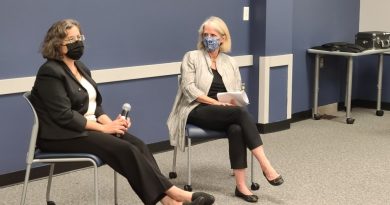Center for Peace and Conflict Studies Speaker Series: “Peacemaking in Lebanon” with Mr. Assaad Chaftari
Anita Baloukjy
Staff Writer
On Monday, November 2, The Center for Peace and Conflict Studies at Seton Hall University’s School of Diplomacy and International Relations presented “Peacemaking in Lebanon” with Mr. Assaad Chaftari, as a part of its speaker series. In his talk, he shared his personal journey and what that journey means for present peacebuilding efforts in Lebanon. Mr. Chaftari is the co-founder and vice president of Fighters for Peace, an NGO based in Lebanon and comprised of ex-civil war fighters.
Mr. Chaftari began by outlining the stark difference between his former and current perceptions of Muslims. “The Muslim was someone so different from us that it was thought they were best avoided. The difference was a social and political one.” Mr. Chaftari explained that at the time this view was based on the fact that Muslims were considered inferior, lazy, and poor. It was only until later did he realize this was a result of Christian prerogatives.
It was not until a coup in 1985 by fellow Christians following a tripartite agreement in Lebanon that Mr. Chaftari’s view towards Muslims started to change. After meeting with dialogue groups, Mr. Chaftari began his path of reconciliation with the Muslim community. This involved issuing a public apology. Since then he has been dedicated to fostering peace with Fighters for Peace. He focuses on building bridges between divided communities in cities such as Tripoli and Beirut.
When reflecting on peacebuilding, Mr. Chaftari described that politicians in Lebanon are invested in the present broken system. Politicians are not willing to work towards peace as it means admitting faults and taking responsibility for their role in the conflict. He posed the question of how we can ask politicians and leaders to accept and admit their mistakes if they think that strength is their asset, and taking responsibility would weaken them.
Delving further into this relationship, Mr. Chaftari stated that the central government in Lebanon is weaker than any other component. No central pillar exists in Lebanon to protect its people and declare who is at fault. Politicians and sectarian leaders dominate law enforcement and legal positions in a justice system that Mr. Chaftari described as being broken. Mr. Chaftari alluded to the recent explosion in the Beirut port as a prime example of this, explaining that even fifty days after the explosion, officials have not found the real perpetrator(s).
The discussion transitioned to the question of marginalization and how the government will help certain minorities. “It is a country of minorities, and every minority is fearing that it might melt and disappear among the others,” Mr. Chaftari stated. In his view, everyone is ready for a new Lebanon, but fear is stopping the change from occurring. Every group is afraid of the ‘other.’
When asked about his thoughts on Lebanon’s hope for a secular government in the near future, Mr. Chaftari noted, “we are asking the leaders of the sectarian clans to do it themselves, to annihilate themselves, and this cannot work.” To come to a secular government, mutual trust and friendship must develop. This raises the idea of transformational leadership and communicating that to wider society, one of the challenges of peacebuilding.
Fighters for Peace is a grassroots NGO. It works with politicians, political parties, and clergy members to spread the message that violence is never the answer, and that change is possible even if it seems unattainable. The price to be paid for peace is ego, pride, and thinking of not only yourself and your interests, but of everyones. Mr. Chaftari put it best saying, “peace is not parachuted in, but built from within.”
In his closing, Mr. Chaftari maintained that personal transformations help transform others. “If you want to change situations let us work on changing hearts.”



